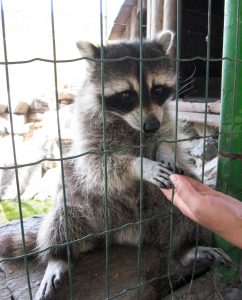Pet raccoons are funny, intelligent, and fascinating creatures; but they are also trouble-makers, and can cause a lot of destruction, mess, and mischief for a homeowner. This is why breeding raccoons requires a thorough understanding of all the hardships and hard work that’s involved in the process.
Raccoon Breeding and Domestication
As far as nature has it, wild raccoons typically use the months of February and March to breed. Even though these are the natural months for wild raccoons to mate, mating can take place anywhere from December, all the way to June. Of course, this largely depends on the local climate and latitude. Gestation periods last around 8 weeks, and new raccoon pups are typically born in the months of April or May. Female coons that breed later in the season can give birth to newborn pups as late as summertime. Raccoons only raise one litter per year in the wild. With this simple understanding of how raccoons breed and mate in nature, you can use this knowledge to compare the circumstances of domesticated raccoon breeding.
Pros of Raccoon Breeding
Raccoons are intelligent, playful, fun-loving, trainable, and adorable. They can be trained like a canine or cat with treats, rewards, and repetition. Because they are smart, owners enjoy learning and bonding with their pet raccoon’s personality. They each have their own temperament and character. It is rewarding watching them play and interact with other family pets; like cats and dogs. Pet raccoons that are successfully domesticated can get along very well with dogs, cats, and other household pets. They can live for many years, sometimes outliving their owners. This gives owners ample time to bond and admire their pet raccoon. Newborn pup raccoons are profitable as well. You can breed and sell them on the market for at least $500 per pup, and sometime more depending on the species of raccoon. Of course, not just anyone can own a pet raccoon; it is usually wildlife rehabilitators, researchers, zoologists, and similar vocations that would permit the holding of a wild animal like a raccoon.
Cons to Raccoon Breeding
Unfortunately, you will see there are several more controversial facts surrounding raccoon domestication and breeding than there are advantages. This is because raccoons are wild animals that are simply not meant to be domesticated. It takes millions of years to properly domesticate a wild animal. Cats and dogs have been domesticated by man as far back as the Paleolithic Era. In order to tame raccoons in the same way, it would take lifetime after lifetime to achieve the same level of domestication. Raccoons are instinctively wild no matter how well a person thinks they have tamed their pet. They will always have the potential to attack or become aggressive, which could lead to serious injuries and disfigurement. In essence, pet raccoons are a danger risk and a person is inviting this risk into their lives once they adopt or breed raccoons.
Raccoons are also very messy, destructive, and relentless. They have dexterous paws that allow them to clasp and grab just as a human would. This means they can open doors, locks, latches, and more. They can take items in a home and hide them or destroy them. They defect and urinate everywhere, even though owners attempt to litter box train them. Their urine is high in ammonia, just like a cat’s urine. This means it has a highly distinctive and pungent odor that is difficult to eliminate. Pet raccoons require an ample amount of living space and amenities to keep them entertained. Because raccoons are so intelligent, they are relentlessly curious. If a pet raccoon owner does not provide generous amounts of toys and play equipment, they can expect a lot more home destruction. If a pet raccoon becomes bored, they will roam through a home and find something to do. This usually leads to a large and costly mess.
Be Sure You Know the Law
The most important to fact to consider when it comes to raccoon breeding and domestication is the law. It is illegal to own, let alone breed, raccoons in various states, including Kentucky. Take a look at this excerpt from the Kentucky Department of Fish and Wildlife Resources about exotic animal holding:
“(…)The Department does not issue permits for the holding (i.e. possession within Kentucky) of exotic wildlife; however, importation or transportation of exotic wildlife from out-of-state, requires a wildlife transportation permit. (…) Local ordinances may be stricter than state regulation, and some counties and cities prohibit additional species or restrict wildlife possession beyond the level of the state. It is a person’s individual responsibility to ensure compliance with all local ordinances. Always ensure a species you plan to possess is legal through all levels of government.”
It is crucial to review your local ordinances before adopting an exotic pet like a raccoon. Breaking animal domestication laws can result in hefty fines and penalties.


